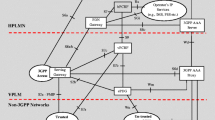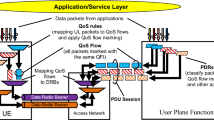Abstract
As the first OFDMA-based cellular packet radio network, Evolved UTRAN has already been well studied in 3GPP and semi-persistent scheduling was selected as the most relevant packet scheduling scheme for VoIP traffic. With further evolution of Evolved UTRAN to meet the ambitious goal set by IMT-A, the performance of VoIP needs to be enhanced. In this article, we establish a semi-persistent scheduling centered framework for efficient VoIP support in OFDMA-based packet radio network and evaluate different enhancement methods, such as adaptive transmission bandwidth in persistent resource allocation, dynamic packet bundling, and frequency diversity transmission that can be added into this framework. In addition, we investigate practical constraints, e.g. wideband CQI reporting on real network performance as well as possible corrective measures. The whole system design is verified through large-scale network level simulations in which all the details of various VoIP-specific radio resource management algorithms and enhancement mechanisms as well as interactions between them are explicitly modeled. Simulation results indicate that VoIP in Evolved UTRAN can be well supported using this framework and further improved through different enhancement methods. Compared with fixed transmission bandwidth approach, adaptive transmission bandwidth approach can provide additional capacity gain of 11 and 8% respectively in 3GPP Macro Case 1 and Case 3 deployment scenario. In a highly-loaded network, switching from adaptive transmission bandwidth to dynamic packet bundling can accommodate 18 and 15% more users in Case 1 and 3 respectively. The performance degradation due to wideband CQI reporting can be partly compensated with frequency diversity transmission. It is finally concluded that the enhanced performance of VoIP is sufficient to meet the ambitious target set by IMT-A in all four ITU deployment scenarios.
Similar content being viewed by others
References
Cuny, R., & Lakaniemi, A. (2003). VoIP in 3G neworks: An end-to-end quality of service analysis. In Proceedings of IEEE vehicular technology conference. Jeju, Korea. April.
Wang, B., Pedersen, K. I., Kolding, T. E., & Mogensen, P. E. (2005). Performance of VoIP on HSDPA. In Proceedings of IEEE vehicular technology conference. Stockholm, Sweden. May.
Xiao, W., Ghosh, A., Schaeffer, D., & Downing, L. (2005). Voice over IP (VoIP) over Cellular: HRPD-A and HSDPA/HSUPA. In Proceedings of IEEE vehicular technology conference. Dallas, TX, USA. September.
Holma, H., Kuusela, M., Malkamäki, E., Ranto-aho, K., & Chen, T. (2006). VoIP over HSPA with 3GPP Release 7. In Proceedings of IEEE international symposium on personal, indoor and mobile radio communications. Helsinki, Finland. September.
Lundén, P., & Kuusela, M. (2007). Enhancing performance of VoIP over HSDPA. In Proceedings of IEEE vehicular technology conference. Dublin, Ireland. April.
Nory, R., et al. (2007). Uplink VoIP support in 3GPP EUTRA. In Proceedings of IEEE vehicular technology conference. Dublin, Ireland. April.
Persson, F. (2007). Voice IP realized for the 3GPP long term evolution. In Proceedings of IEEE vehicular technology conference. Baltimore, MD, USA. October.
Fan, Y., Kuusela, M., Lundén, P., & Valkama, M. (2008). Downlink VoIP support for evolved UTRA. In Proceedings of IEEE wireless communication and networking conference. Las Vegas, NV, USA. April.
Fan, Y., Lundén, P., Kuusela, M., & Valkama, M. (2008). Efficient semi-persistent scheduling for VoIP on EUTRA downlink. In Proceedings of IEEE vehicular technology conference. Calgary, Canada. September.
Puttonen, J., Kolehmainen, N., Henttonen, T., & Moisio, M. (2008). Persistent packet scheduling performance for Voice-over-IP in evolved UTRAN downlink. In Proceedings of IEEE international symposium on personal, indoor and mobile radio communications. Cannes, France. September.
Third Generation Partnership Project. (2008). Evolved Universal Terrestrial Radio Access (E-UTRA) Medium Access Control (MAC) protocol specification. TS 36.321, Release 8.
International Telecommunication Union. (2008). Requirements related to technical performance for IMT-Advanced radio interface(s). Report ITU-R M.2134.
Rinne, M., et al. (2009). A performance summary of the evolved 3G (E-UTRA) for Voice over Internet and best effort traffic. IEEE Transactions on Vehicular Technology, 58(7), 3661–3673, September.
Third Generation Partnership Project. (2008). Evolved universal terrestrial radio access (E-UTRA) and evolved universal terrestrial radio access network (E-UTRAN); Overall description; Stage 2. TS 36.300, Release 8.
Third Generation Partnership Project. (2006). Physical layer aspects for evolved universal terrestrial radio access (UTRA). TR 25.814, Release 7. version 7.1.0, September.
Brady P. T. (1965) A technique for investigating on-off speech patterns for speech. Bell Systems Technical Journal 44(1): 1–22
Brady P. T. (1969) A model for generating on-off speech patterns in two-way conversations. Bell Systems Technical Journal 48(9): 2445–2472
Internet Engineering Task Force. (2001). RObust header compression (ROHC). IETF RFC 3095. SAC-2(4), 528–539, July.
International Telecommunication Union. (2003). One way transmission time. Recommendation ITU-T G.114. February.
Orange, China Mobile, KPN, NTT DoCoMo, Sprint, T-Mobile, Vodafone, Telecom Italia. (2007). LTE physical layer framework for performance verification. R1-070674. 3GPP TSG-RAN1#48. St. Louis, MI, USA. February.
Third Generation Partnership Project. (2008). Requirements for evolved UTRA (E-UTRA) and evolved UTRAN (E-UTRAN). TR 25.913, Release 8.
Ericsson. R1-060099. (2006) Persistent scheduling for E-UTRA. 3GPP TSG-RAN1 LTE AdHoc. Helsinki, Finland. January.
Winters, J. H. (1984). Optimum combining in digital mobile radio with cochannel interference. IEEE Journal on Selected Areas in Communications, SAC-2(4), 528–539, July.
Nokia & Nokia Siemens Networks. (2007). Further considerations on DL semi-persistent scheduling. R2-071743. 3GPP TSG-RAN2#58. Kobe, Japan. May.
Jalali, A., Padovani, R. & Pankaj, R., (2000). Data throughput of CDMA-HDR high efficiency-high data rate personal communication wireless systems. In Proceedings of IEEE vehicular technology conference. Tokyo, Japan. May.
Fan, Y., Lundén, P., Kuusela, M., & Valkama, M. (2008). Performance of VoIP on EUTRA downlink with limited channel feedback. In Proceedings of IEEE international symposium on wireless communication system. Rekjevik, Iceland. October.
Laselva, D., et al. (2009). On the impact of realistic control channel constrainst on QoS provisioning in UTRAN LTE. In Proceedings of IEEE vehicular technology conference. Barcelona, Spain. April.
Brueninghaus, K., et al. (2005). Link performance models for system level simulations of broadband radio access systems. In Proceedings of IEEE international symposium on personal, indoor and mobile radio communications. Berlin, Germany. September.
Henttonen, T., et al. (2008). Performance of VoIP with mobility in UTRA long term evolution. In Proceedings of IEEE Vehicular Technology Conference. Singapore. May.
International Telecommunication Union. (2008). Guidelines for evaluation of radio interface technologies for IMT-Advanced. Report ITU-R M.2135.
Ericsson. (2009). Radio characteristics of the ITU test environments and deployment scenarios. R1-091320. 3GPP TSG-RAN1#56bis. Seoul, Korea. March.
Author information
Authors and Affiliations
Corresponding author
Rights and permissions
About this article
Cite this article
Fan, Y., Valkama, M. Enhanced VoIP Support in OFDMA-based Packet Radio Networks. Wireless Pers Commun 66, 343–366 (2012). https://doi.org/10.1007/s11277-011-0345-0
Published:
Issue Date:
DOI: https://doi.org/10.1007/s11277-011-0345-0




